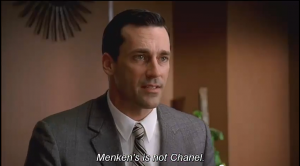Victoria Truitt is a Senior at the University of Alabama studying Political Science and Spanish. She spends her free time binge-watching her favorite shows on Netflix and questioning every little thing about today’s culture. She aspires to work in politics after graduation.
When I think of identity, I think of a constantly developing definition that is open to interpretation. A person’s identity is never complete because it depends not only on that person’s image of themselves, but also on the people he or she interacts with in different situations. Cultivating one’s identity, therefore, is first and foremost strategic. After thinking about this concept in relation to religion in class, I automatically thought of one of my favorite episodes of Mad Men (Season 1, Episode 1, “Smoke gets in your eyes”).
Anyone who has seen Mad Men knows that there is a lot more to the story than debonair men in beautiful suits, smoking and drinking in their plush New York offices before noon. One of the biggest themes of the show is cultivating identity. Strategic identity is obviously important in advertising, but it also becomes important for character development in the series. All of the characters strategically conceal or reveal their identities in order to achieve a social or personal goal. One of the most striking examples of strategic identification in the series occurs when Don has to come up with an advertising campaign for Rachel Menken, a wealthy Jewish woman who owns a struggling department store in Manhattan.
In the clip, the problem of strategic identification comes in to play not only for Rachel’s store, but also for Rachel’s identity and Don’s identity. Rachel tries to strategically identify her store by comparing it to the other stores within close proximity of it. She wants to be able to identify her store as a novelty like other luxury stores in order to make more money. Don, however, thinks the best solution for the store’s decline in sales would be to provide coupons, because “Menken’s isn’t Chanel”. He seeks to identify the store by what it is not, which imposes a negative identity on both Rachel and the store. Pete Campbell manages to make things even worse by attacking Rachel’s religious identity as a Jew. He sees her religious identification as a contributing factor for the store’s decline in sales and its unpopularity. His assumption reveals that Rachel’s self-imposed religious identification somehow makes her store less luxurious and high-end than others. This type of identification marginalizes Rachel because, according to Campbell, only agencies that also have employees with Jewish backgrounds can help her. Rachel resists this suggestion, and even seems to resent her identity as a Jew because of the way others treat her. She sticks to it because she cannot escape this facet of her identity, even though it strategically works as a disadvantage for her. Finally, Don gets even more personal by refusing to finish the meeting because he identifies himself as a man who does not tolerate being challenged by a woman. Don uses this strategic identification in order to assert dominance and defend himself against Rachel’s criticism.
The clip perfectly portrays the problems individuals encounter when their strategic identifications clash with others. The strategic identification in this clip and throughout the series challenge our socioeconomic, gender, and religious identities. These types of cultural examinations of strategic identity are important because they remind us that who we are is more complex and calculated than we realize, even though we consciously participate in it everyday.
